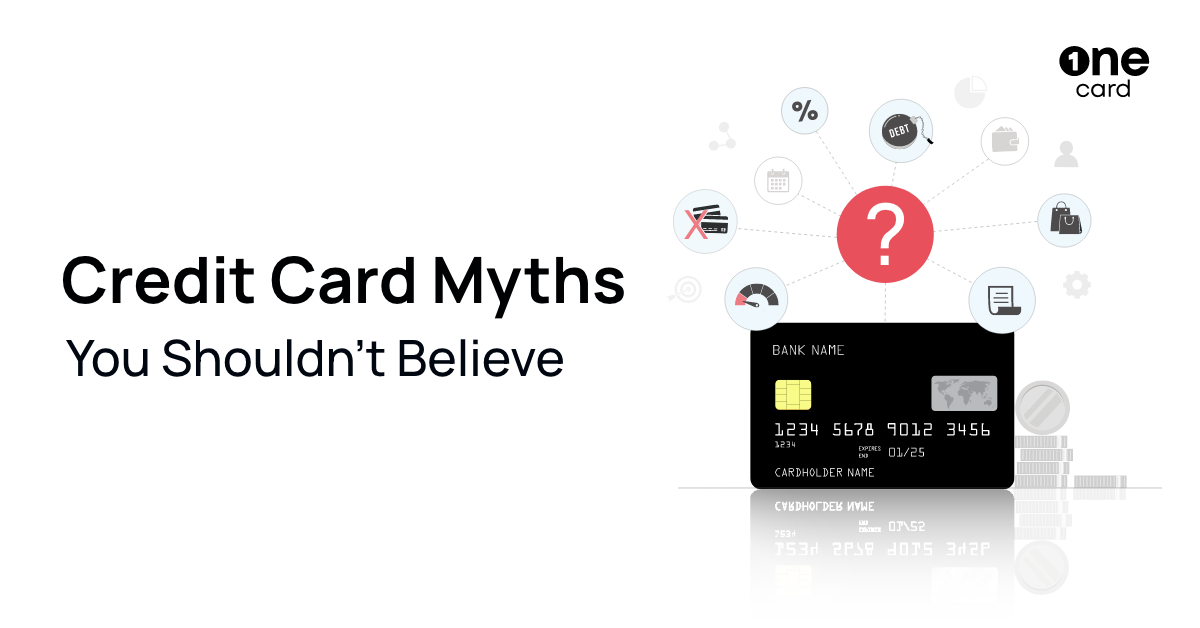5 Common Credit Card Myths Busted
By OneCard | June 28, 2023

Imagine being the first person in your family to hold a credit card in your hands. It's a symbol of financial independence and a world of possibilities. But as you navigate this new territory, you may wonder how to make the most of this powerful tool. What are the common myths that may hinder your experience of utilising your credit card fully?
Common Myths That May Impact Your Outlook Towards Credit Cards
Myth 1: Credit cards encourage irresponsible spending
One of the most prevalent misconceptions about credit cards is that they encourage reckless and impulsive spending habits. While it's true that misusing credit cards can lead to financial troubles, the problem lies not with getting a credit card but with the way it is used .
The key to making the most of credit cards, lies in setting a budget, paying off the balance in full each month, and using the card as a mode of payment, rather than a source of funds.
For example, if you have a credit card with a high spending limit that you haven't used up yet, it might be tempting to buy that fancy gadget you've been dreaming of. But here's the thing: responsible credit card use means making smart purchase choices.
Instead of giving in to the urge to buy something on a whim, responsible credit card usage involves thinking carefully about your disposable income, your actual needs, and your long-term financial goals.
Myth 2: Having multiple credit cards ruins your credit score
Another common myth is that having multiple credit cards negatively impacts your credit score. In reality, the number of credit cards you possess doesn't directly affect your credit score. What matters is how you utilise them. Responsible usage habits, such as paying bills on time and keeping your credit utilisation ratio low, play a vital role in maintaining a healthy credit score. Additionally, having multiple credit cards can provide a higher overall credit limit, which can help keep your credit utilisation ratio low and positively impact your credit score.
Myth 3: Using a credit card means being in debt
People who are new to credit typically believe that using a credit card automatically puts them in debt. Using a credit card doesn't mean you're destined for a life of debt. In fact, it's entirely possible to use a credit card without accumulating any debt at all.
Credit cards work on revolving credit. This means you can make purchases using your card and have the option to pay off the full balance each month without any interest charges.
To understand this better, it's important to first understand the difference between good debt and bad debt. Good debt refers to borrowing money for investments that have the potential to increase in value or provide long-term benefits, such as buying a home or pursuing higher education. Bad debt, on the other hand, involves borrowing money for purchases that don't appreciate in value or don't contribute to your financial well-being, like splurging on luxury items or unnecessary expenses. By using a credit card responsibly and paying off your balance each month, you can avoid falling into the trap of bad debt. You can take advantage of the benefits that credit cards offer, such as building a positive credit history, earning rewards, and enjoying added purchase protection.
Myth 4: All credit cards have exorbitant interest rates
While it's true that credit cards can have high-interest rates if balances are not paid in full, assuming that all credit cards have exorbitant interest rates is a misconception. The interest rates associated with credit cards vary depending on several factors, including the cardholder's credit history, credit score, and type of card. Many credit cards come with introductory offers, low or even zero percent interest rates for a certain period, and rewards programs that can help offset interest charges. By comparing different credit card options, you can find cards with favorable interest rates that align with your financial needs.
Myth 5: Closing a credit card improves your credit score
You might have heard that closing a credit card you don't use anymore can help you improve your credit score. But guess what? That's not quite true. In fact, closing a credit card can actually have a negative impact on your credit score.
Let's break this concept down further: Your credit utilisation ratio is an important factor in determining your credit score. It's the amount of credit you're using compared to the total credit you have available. When you close a credit card, you reduce your overall available credit. This means that if you have any balances on your other credit cards or loans, your credit utilisation ratio will increase. And a higher credit utilisation ratio can lower your credit score.
Here's another thing to consider: Closing a credit card can also affect your average age of accounts. The length of time you've had credit accounts for a portion of your credit score. So, if you close an older credit card, it could bring down your average age of accounts and potentially impact your credit score.
However, it's important to find the right balance. While closing a credit card can have some negative effects, you might need to do so if you're paying high annual fees or if you're prone to overspending. Just be aware that it could have an impact on your credit score.
The key is to be mindful of your credit utilisation ratio and the overall health of your credit history. If you're considering closing a credit card, think it through and weigh the pros and cons.

The Bottom Line
Credit cards are often misunderstood and surrounded by misconceptions. By debunking them, we hope to provide you with a fresh perspective on credit cards and empower you to make informed choices about their usage. Remember, credit cards can be powerful financial tools when used responsibly. By setting a budget, paying off balances on time, and using credit cards wisely, you can reap the variety of benefits they offer, including convenience, security, and rewards.
Frequently Asked Questions
Can credit cards lead to debt?
Credit cards themselves do not automatically lead to debt. It depends on how responsibly you use them. Paying off your balance in full each month helps you avoid falling into a debt trap and accruing interest charges.
Will having multiple credit cards hurt my credit score?
No, having multiple credit cards won't hurt your credit score if you manage them wisely. Paying bills on time and keeping your credit utilisation ratio low are key factors in maintaining a good credit score.
Do all credit cards have high-interest rates?
Not all credit cards have high-interest rates. Interest rates vary depending on factors like your credit history and the type of card you choose. Some cards offer low or even zero percent interest rates for a certain period.
Can credit cards help build a credit history?
Yes, responsible use of credit cards can help build a positive credit history. Making timely payments and keeping your credit utilisation low demonstrate good financial management and can improve your credit score.
Do I need a credit card if I have a debit card?
While debit cards allow you to spend money from your bank account, credit cards offer additional benefits such as fraud protection, the building of a credit score, and the possibility of earning reward points.

**Disclaimer: The information provided in this webpage does not, and is not intended to, constitute any kind of advice; instead, all the information available here is for general informational purposes only. FPL Technologies Private Limited and the author shall not be responsible for any direct/indirect/damages/loss incurred by the reader for making any decision based on the contents and information. Please consult your advisor before making any decision.



Sharing is caring 😉